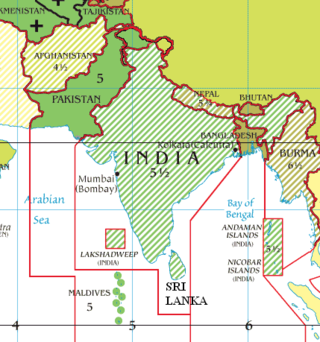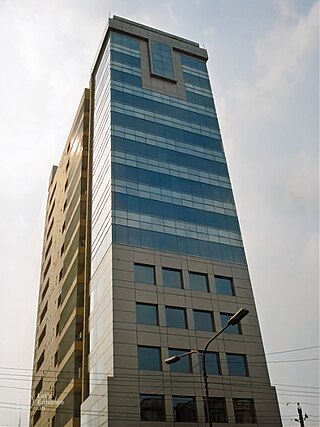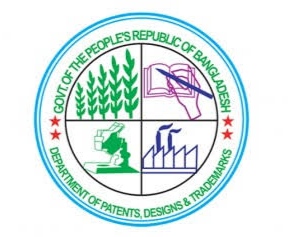Related Research Articles

Bangladesh, officially the People's Republic of Bangladesh, is a country in South Asia. It is the eighth-most populous country in the world and is among the most densely populated countries with a population of nearly 170 million in an area of 148,460 square kilometres (57,320 sq mi). Bangladesh shares land borders with India to the north, west, and east, and Myanmar to the southeast. To the south, it has a coastline along the Bay of Bengal. It is narrowly separated from Bhutan and Nepal by the Siliguri Corridor, and from China by the mountainous Indian state of Sikkim in the north. Dhaka, the capital and largest city, is the nation's political, financial, and cultural centre. Chittagong, the second-largest city, is the busiest port on the Bay of Bengal. The official language of Bangladesh is Bengali while Bangladeshi English is also used in the government and official documents alongside Bengali.

Dhaka, formerly known as Dacca, is the capital and largest city of Bangladesh. It is the ninth-largest and seventh-most densely populated city in the world. Dhaka is a megacity, and has a population of 10.2 million residents as of 2022, and a population of over 22.4 million residents in Dhaka Metropolitan Area. It is widely considered to be the most densely populated built-up urban area in the world. Dhaka is the most important cultural, economic, and scientific hub of Eastern South Asia, as well as a major Muslim-majority city. Dhaka ranks third in South Asia and 39th in the world in terms of GDP. Lying on the Ganges Delta, it is bounded by the Buriganga, Turag, Dhaleshwari and Shitalakshya rivers. Dhaka is also the largest Bengali-speaking city in the world.

The economy of Bangladesh is a major developing market economy. As the second-largest economy in South Asia, Bangladesh's economy is the 35th largest in the world in nominal terms, and 25th largest by purchasing power parity. Bangladesh is seen by various financial institutions as one of the Next Eleven. It has been transitioning from being a frontier market into an emerging market. Bangladesh is a member of the South Asian Free Trade Area and the World Trade Organization. In fiscal year 2021–2022, Bangladesh registered a GDP growth rate of 7.2% after the global pandemic. Bangladesh is one of the fastest growing economies in the world.

The foreign relations of Bangladesh are Bangladesh's relationships with foreign countries. The Government of Bangladesh's policies pursue a moderate foreign policy that heavily relies on multilateral diplomacy, especially at the United Nations (UN) and the World Trade Organization (WTO). Since its independence in 1971, Bangladesh has stressed its principle of "Friendship towards all, malice towards none" in dictating its diplomacy. As a member of the Non-Aligned Movement, Bangladesh has tended to not take sides with major powers. Since the end of the Cold War, Bangladesh has pursued better relations with its neighbours and other nearby states.

Chittagong, officially Chattogram, is the second-largest city in Bangladesh. Home to the Port of Chittagong, it is the busiest port in Bangladesh and the Bay of Bengal. It is the administrative seat of an eponymous division and district. The city is located on the banks of the Karnaphuli River between the Chittagong Hill Tracts and the Bay of Bengal. The Greater Chittagong Area had a population of more than 5.2 million in 2022. In 2020, the city area had a population of more than 3.9 million. The city is home to many large local businesses and plays an important role in the Bangladeshi economy.

The Bangladesh Awami League, often simply called the Awami League or AL, is one of the major political parties in Bangladesh. The oldest existing political party in the country, Awami League successfully lead Bangladesh to the independence. One of the two most dominant parties in the country, along with its archrival Bangladesh Nationalist Party, it has been the ruling party since 2009, and has since been described as authoritarian.

Education in Bangladesh is administered by the country's Ministry of Education. The Ministry of Primary and Mass Education implements policies for primary education and state-funded schools at a local level. Education in Bangladesh is compulsory for all citizens until the end of grade eight. Primary and secondary education is funded by the state and free of charge in public schools.

The Directorate General of Forces Intelligence, commonly known by its acronym DGFI, is the defense intelligence agency of the Bangladesh Armed Forces, tasked with collection, collation and evaluation of strategic and topographic information, primarily through human intelligence (HUMINT). As one of the principal members of the Bangladesh intelligence community, the DGFI reports to the Director-General under the executive authority of the head of government, the Prime Minister, and is primarily focused on providing intelligence for the Prime Minister, the Cabinet of Bangladesh, and the Armed Forces of Bangladesh.
The Institute of Chartered Accountants of Bangladesh (ICAB) is the national professional accountancy body and research institute in Bangladesh. It is the sole organisation in Bangladesh with the right to award the Associate Chartered Accountant designation. It has 2,005 members.

Bangladesh Standard Time is the time zone of Bangladesh. It is offset six hours ahead of Coordinated Universal Time, and observed as a national standard throughout the country. Bangladesh briefly observed daylight saving time (DST) in 2009 to cope with the ongoing electricity crisis, but in 2010 the decision was cancelled by the government of Bangladesh.
Law enforcement in Bangladesh is one part of the Justice System in Bangladesh along with Prisons and Courts.

Jamuna Group is one of the largest Bangladeshi industrial conglomerates. It operates in a range of industry sectors, including Textiles, Chemicals, Leather, motor cycles, Consumer products, Media and Advertisement.
The information technology sector in Bangladesh had its beginnings in nuclear research during the 1960s. Over the next few decades, computer use increased at large Bangladeshi organizations, mostly with IBM mainframe computers. However, the sector only started to get substantial attention during the 1990s. Today the sector is still in a nascent stage, though it is showing potential for advancement. Nonetheless, Bangladesh IT/ITES industry has fared comparatively well by achieving US$1.3 billion export earnings in FY 2020-21 and holding US$1.4 billion equivalent market share in the local market contributing 0.76 per cent to the GDP creating more than 1 million employment opportunities so far amid Covid-19 havoc that suddenly shattered businesses last year. Consequentially, riding on the successes of IT/ITES sector-supported export-led industries as well as pro-private sector and conducive policies pursued by Bangladesh Government, the country is now poised to become a Developing Country by 2026, as recommended by the United Nations Committee for Development Policy (UNCDP), besides, Bangladesh now seeks to transform itself into a knowledge-based and 4IR-driven cashless economy, aiming to become a developed country by 2041. The Bangladesh government has formulated a draft 'Made in Bangladesh– ICT Industry Strategy' aimed at turning Bangladesh into an ICT manufacturing hub, enhancing export of local products, attracting foreign investment and creating employment proposing to implement in three

PRAN-RFL Group is a Bangladeshi multinational conglomerate, based in Dhaka, Bangladesh. The company is known for its diversified business portfolio, including food and beverage, plastic products, and agricultural machinery. It is one of the largest conglomerates in Bangladesh, with a presence in more than 145 countries. Pran-RFL Group is headquartered in Dhaka, Bangladesh, and employs over 140,000 people worldwide. The group operates under several subsidiaries, including Pran Foods, RFL Plastics, Pran-RFL Healthcare, and many others.

The Ministry of Industries is primarily responsible for developing new policies and strategies for promotion, expansion and sustainable development of Industrial sector of Bangladesh. The minister as of January 2019 was Nurul Majid Mahmud Humayun.

Bangladesh Association of Software and Information Services (BASIS) is the national association of Software and information and communication technologies companies in Bangladesh.
Bureau of Mineral Development is a government bureau responsible for the management and generation of revenue from mineral resources and is located in Dhaka, Bangladesh.

The Department of Patents, Designs and Trademarks is the main government department responsible for patents and trademarks in Bangladesh and is located in Dhaka, Bangladesh.
Department of Films and Publications is a Bangladesh government department, under the Ministry of Information, responsible for regulating the film and publication industries. S M Golam Kibria is the Director General of the department. It is located in Circuit house road, Dhaka, Bangladesh.
References
- ↑ "EATL receives National Productivity and Quality Excellence Award 2015". The Daily Star. 31 October 2016. Retrieved 30 December 2017.
- ↑ "Hasina declares productivity move". The Daily Star. 3 October 2011. Retrieved 30 December 2017.
- ↑ "National Productivity Organization (NPO)". npo.gov.bd. Retrieved 29 December 2017.
- ↑ "What drives productivity?". The Daily Star. 31 March 2016. Retrieved 30 December 2017.